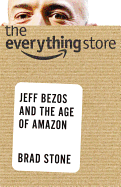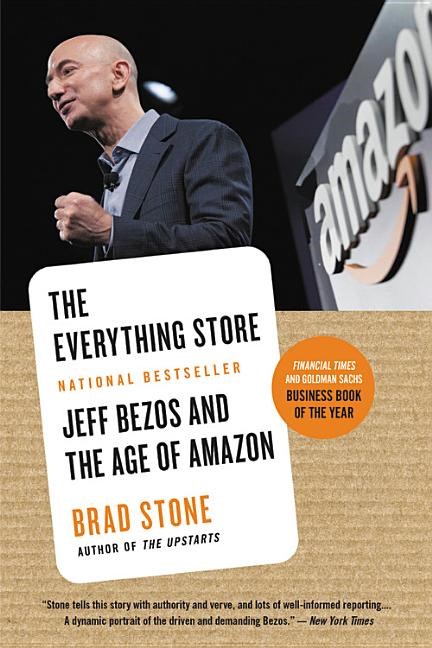The Everything Store by Brad Stone
December 04, 2013
So, how does a specialty bookseller like 800-CEO-READ tackle reviewing Brad Stone's new book on the biggest bookstore in the world? We could ignore the book. We could deride the book.
 So, how does a specialty bookseller like 800-CEO-READ tackle reviewing Brad Stone's new book on the biggest bookstore in the world? We could ignore the book. We could deride the book. We could talk about the book only in terms of others' opinions about it, as we did last week in announcing Stone's Financial Times and Goldman Sachs Business Book of the Year win. But doing any of those things feels like a defensive approach, one born out of Amazon's position as our biggest (and boldest, and maybe baddest) competitor. But if we--and here I mean "the royal we"--didn't have competitors, then how would we be spurred toward improvement and innovation? So, what do we make of Brad Stone's tale of Amazon's success and its visionary leader's attitude toward conquering the world by selling everything? First, we think The Everything Store is an excellent book. A fast and accessible read that provides all the drama and detail we desire in this type of investigative non-fiction. Next, we think Bezos is an impressive and gutsy leader. Even if you disagree with his tactics, Bezos has always known how Amazon's bread gets buttered: by the customers. He looked for an industry that could be readily disrupted, publishing, and then determined to bring books to customers in every and any way they might need, no matter the method, no matter the established rules, no matter the competition.
So, how does a specialty bookseller like 800-CEO-READ tackle reviewing Brad Stone's new book on the biggest bookstore in the world? We could ignore the book. We could deride the book. We could talk about the book only in terms of others' opinions about it, as we did last week in announcing Stone's Financial Times and Goldman Sachs Business Book of the Year win. But doing any of those things feels like a defensive approach, one born out of Amazon's position as our biggest (and boldest, and maybe baddest) competitor. But if we--and here I mean "the royal we"--didn't have competitors, then how would we be spurred toward improvement and innovation? So, what do we make of Brad Stone's tale of Amazon's success and its visionary leader's attitude toward conquering the world by selling everything? First, we think The Everything Store is an excellent book. A fast and accessible read that provides all the drama and detail we desire in this type of investigative non-fiction. Next, we think Bezos is an impressive and gutsy leader. Even if you disagree with his tactics, Bezos has always known how Amazon's bread gets buttered: by the customers. He looked for an industry that could be readily disrupted, publishing, and then determined to bring books to customers in every and any way they might need, no matter the method, no matter the established rules, no matter the competition.
Later Bezos recalled speaking at an all-hands meeting called to address the assault by Barnes & Noble. "Look, you should wake up worried, terrified every morning," he told his employees. "But don't be worried about our competitors because they're never going to send us any money anyway. Let's be worried about our customers and stay heads-down focused."
To call Amazon a bookstore underestimates Bezos' vision. It seems it was never his intention to stop at "The World's Largest Bookstore," because Amazon could not become the revolutionary market force he wanted it to become only by selling books.
Bezos now felt expansion into new categories was urgent. In customers' minds, the Amazon brand meant books only. He wanted it to be more malleable, like Richard Branson's Virgin, which stood for everything from music to airlines to liquor. Bezos also needed Amazon to generate the kind of returns that would allow him to invest in technology and stay ahead of rivals.
Stone reveals that this was Bezos' vision from the very beginning. As early as 1994, while Bezos still worked on Wall Street, he and his colleagues, including the owner of his investment firm, D.E. Shaw, dreamed up a number of ventures that would be anchored by the burgeoning technology sector. There was "the concept of a free, advertising-supported e-mail service for consumers," "a new kind of financial service that allowed Internet users to trade stocks and bonds online," and finally: "Shaw and Bezos discussed another idea as well. They called it "The Everything Store." Stone takes us through the early days and much can be learned here by anyone trying to compete with giants. Progress is not for the faint of heart, and Bezos always kept his big, bold vision firmly ahead of him in all of his decision-making.
Bezos used that word a lot: bold. In the company's first letter to its public shareholders... the word bold was used repeatedly. "We will make bold rather than timid investment decisions where we see a sufficient probability of gaining market leadership advantage," they wrote. "Some of these investments will pay off, others will not, and we will have learned another valuable lesson in either case." The letter also stated that the company would make decisions based on long-term prospects of boosting free cash flow and growing market share rather than on short-term profitability, and one section in particular served as a guidepost for the unorthodox way the company planned to approach Wall Street.
But even when being bold, as I mentioned at the top, Bezos always kept pleasing the customer in mind. And one way to do this, beyond low prices, was to make buying very, very easy. They achieved this through their 1-Click ordering system. Stone explains, "By reducing the friction of online buying even marginally, Amazon could reap additional millions in revenue while simultaneously digging a protective moat around its business and hobbling its rivals." Another way to compete with other online sellers was to streamline search results.
Traffic on Amazon was oriented around Amazon's reliable product catalog. On eBay, a customer might search for the Hemingway novel The Sun Also Rises and get dozens of auctions of new and vintage copies. If a customer search for the book on Amazon, there was one single page, with a definitive description of the novel, and that's where customers flocked.
This is all smart and saavy business. And if Amazon 'got there first' why have they earned such a bad reputation? Stone doesn't hesitate to reveal both sides of the company. After all, it hasn't all been smooth sailing for Bezos and Amazon. They have incorrectly invested in a number of failed companies, and it reinforced an internal conviction to stay focused on Amazon itself. And that focus includes Bezos' tight rein on nearly every aspect of the company. "Inside Amazon, employees lived under Bezos's frugal edicts while they watched in awe as he kept pushing more and more chips into the pot." How Bezos relentlessly pursues growth is a constant throughout the book. "There were two ways to accomplish this: either slowly, category by category, or all at once. Bezos tried both paths, and some of his ideas were so outlandish that employees called them "fever dreams." Regardless, the rapid successes of such projects as Amazon's Marketplace and the Kindle (and maybe more importantly, the Kindle store, which was the first large catalog available to e-book readers) shows that Bezos is more than a dreamer; he is a shrewd businessman. But that shrewdness comes at a cost, Stone explains, and often it was the Amazon employees who took the first hit.
With his convincing gospel, Bezos had persuaded them all to have faith, and they were richly rewarded as a result. Then the steely-eyed founder replaced them with a new and more experienced group of believers. Watching the company move on without them gave these employees a gnawing sensation, as if their child had left home and moved in with another family. But in the end, as Bezos made abundantly clear..., Amazon had only one true parent.
And Bezos's tight control over the company's operations and intense competitive desire caused a sort of multiplication of those same qualities among the other leaders in the company. Together, they pursued a sort of scorched earth policy over all other retailers, especially booksellers. The following passages make it clear that Amazon had a single goal in mind: the reinvention of an industry.
When Amazon began its all-consuming pursuit of profitability after the turn of the century, its attitude toward the rest of the book world began to change. By 2004, Amazon sold a large percentage of all books in the United States. So it aggressively sought more favorable terms in its deals with publishers and tried to reap some of the benefits of its growing size and significance in the industry. [...] In Bezos's perennial quest to subsidize low prices for customers and finance programs like Super Saver Shipping and Prime, he pushed...to establish more favorable financial relationships with book publishers and expand profit margins wherever they could. Bezos believed Amazon should be well compensated for the special benefits it brought to the book industry. [...] Amazon had an easy way to demonstrate its market power. When a publisher did not capitulate and the company shut off the recommendation algorithms for its books, the publisher's sales usually fell by as much as 40 percent. [...] The resulting program was dubbed the Gazelle Project because Bezos suggested to Blake in a meeting that Amazon should approach these small publishers the way a cheetah would pursue a sickly gazelle.
Later, this approach would be termed "Pay to Play"...which brings to mind the mobster's heavy visiting local bars and restaurants and using some strong-arm threats to elicit payment for the right to keep existing. It's easy to see why this kind of behavior rubs a good number of people the wrong way. And of course publishing isn't the only industry to have been turned upside down by Amazon's indomitable presence in whatever given category. The biggest of the big companies such as Wal-Mart, eBay, Apple, and Google have all taken on Amazon, aware that roadblocks can and should be thrown up to keep Amazon from rolling over them in the same way it rolled over Borders, or absorbed Quidsi and Zappos. And that is the quandary about supporting Amazon. Either we respect Bezos's vision and the smart maneuvers he dictated to achieve them. As Stone says, "These tactics were not unique to Amazon. The company had finally learned the tricks of the century-old trade that is modern retail. Profit margin is finite." Or we judge it all as relentless ambition, gorging on stories of how Amazon avoids collecting sales-tax, demands incredible sacrifices from its employees, and strives to cripple its competitors. Regardless, Bezos is not immune to the criticism, or at the very least, he is aware of it.
During these years of conflict, Jeff Bezos sat down to consider this very question. When Amazon became a company with $100 billion in sales, he wondered, how could it be loved and not feared? As he regularly does, Bezos wrote up his thoughts in a memo and distributed it to his top executives at an S Team retreat. I received a copy through a person close to the company who wished to remain anonymous. The memo, which Bezos titled Amazon.love, lays out a vision for how the Amazon founder wants his company to conduct itself and be perceived by the world. It reflects Bezos's values and determination, and perhaps even his blind spots.
And that too is what Brad Stone's The Everything Store does as well. We more intimately understand the complexity of both Bezos and Amazon. And after reading this book, whether we as consumers opt to press the "Place Your Order" button after filling your cart is really up to us as individuals.


